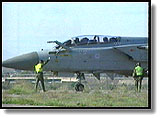
|
Defence Review "to Assess Real Needs"The Government has launched a wide-ranging defence review, insisting that the objective was not to cut costs. Defence Secretary George Robertson said the aim was to assess exactly what Britain needed to defend itself and to play a full role in international peacekeeping.The review, expected to be completed by the end of the year, was trailed in the Queen's Speech. There has been speculation that the Treasury was looking at ways to cut defence spending, but Mr Robertson denied that this was why the review was being carried out. "It can't be Treasury-led. It can't start off with a sort of cost-cutting objective," he told BBC Radio 4.
One question which has been raised in defence circles is whether Britain should keep its capability of waging what is called "high-intensity war" such as that in the Gulf, or concentrate its resources on peacekeeping operations. Yesterday's formal end to the Cold War signed by Nato and Russia gives ammunition to those who argue that Britain simply cannot afford the large quantities of costly, high-tech equipment needed for the former.
Asked whether Britain was trying to 'punch above its weight' by contributing consistently more to peacekeeping work than other similar-sized nations, Mr Robertson stated that, "We do what we do best. We gain in influence as a consequence".
Emphasis on ConsensusMr Robertson said that he and Foreign Secretary Robin Cook would hold two seminars with a wide range of outside experts in coming weeks to look at the "policy baseline" of the review. In parallel, he would set up a panel of experts to feed views into the process and also arrange for opposition parties to contribute. The Defence Secretary warned that while the Government was being encouraged to 'think the unthinkable', others such as international terrorists, criminals and drugs traffickers were already doing so. He said it was the duty of government to stay one step ahead of them. Pressed about the level of defence spending, however, Mr Robertson said it was unrealistic to expect it to go up. What was important was how to work out the best way to spend the money which was available. Warnings and Questions
Mr Campbell also called for "balance" in Britain's defence needs, making it clear he expected that the Government was more likely to reduce defence spending than increase it. He also questioned Britain's need for such a large nuclear capability. doesn't want that, but if it's not watched that's what will happen." The news of a defence review was criticised by the Conservatives. The shadow defence procurement minister, James Arbuthnot, said the review threatened the future of many British arms equipment projects, placing thousands of jobs at risk.
His views were echoed by the former armed forces minister Nicholas Soames. He said that there was no need for a review. He described it as a pointless operation, given that the Tories had already restructured the forces in the post-Cold War world. Mr Soames told BBC Radio that under Labour, the result of the review would be smaller armed forces, a smaller budget, and a less capable operation".
|
Diana, Princess of Wales, 1961-1997
Conference 97
Devolution
The Archive
News |
Issues |
Background |
Parties |
Analysis |
TV/Radio/Web
Interactive |
Forum |
Live |
About This Site
News |
Issues |
Background |
Parties |
Analysis |
TV/Radio/Web
Interactive |
Forum |
Live |
About This Site
© BBC 1997 |
politics97@bbc.co.uk |




